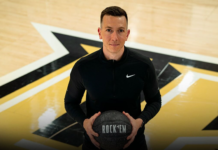The University of Central Florida will once again be joining forces with NASA.
Beginning later this year, UCF will become home to NASA’s Center for Lunar and Asteroid Surface Science (referred to as CLASS) thanks to a $6 million grant awarded this week to UCF physics professor Daniel Britt, UCF said it a statement earlier this week.
CLASS will provide critical research in areas NASA has identified as key to future robotic and human space-exploration missions. The CLASS was one of nine organizations selected under NASA’s Solar System Exploration Research Virtual Institute program, which NASA announced Wednesday.
“This makes UCF a leader in the area of solar system exploration,” Britt said. “The center will bring together a group of world-class researchers to create a one-stop shop of scientific expertise, supporting NASA’s exploration goals. CLASS makes Central Florida integral to NASA’s exploration future.”
Britt is an international expert on out-of-this-world rocks. He is a geologist and physics professor at UCF investigating the properties of lunar and Martian rocks under several NASA grants. Britt also is a former chairperson of the Division for Planetary Sciences of the American Astronomical Society, the largest international professional association for planetary scientists. Additionally, every NASA rover on Mars houses at least one instrument Britt designed to help scientists understand the surface of the Red Planet.
CLASS includes a number of researchers at UCF and the Florida Space Institute housed at UCF who conduct cutting-edge space research on NASA missions such as Cassini, which is orbiting Saturn, and OSIRIS-Rex, a mission to sample a near-Earth asteroid. Scientists at UCF also work with commercial space companies helping make an economic impact on the community.
“CLASS diversifies the science and exploration-industry in Florida,” Britt said. “This center, this kind of impact – that’s why you have state universities. UCF can and should be an engine of knowledge-based growth in Florida. We’re contributing to science, impacting the economy, and making sure Florida stays a leader in the space game.”
Britt will lead the center, which also involves 15 lead researchers from UCF, Kennedy Space Center, other NASA Centers, and universities around the nation, in addition to 23 collaborating researchers from the United States and four other nations.
“CLASS is a big win for Central Florida,” said Ray Lugo, the director of FSI and a former deputy program manager of the Launch Services Program at NASA’s Kennedy Space Center. “NASA recognizes our space science achievements and the leadership potential of UCF and FSI for their exploration programs.”






